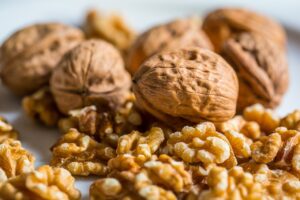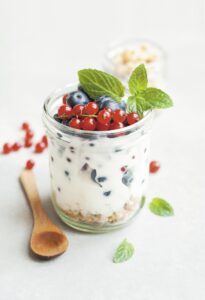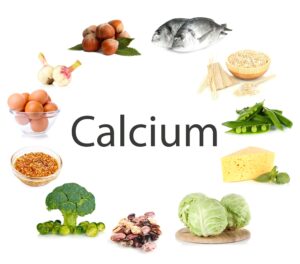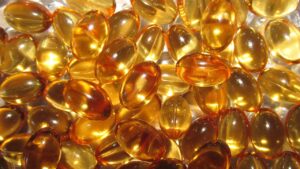Walnuts are perhaps the most famous tree nut of all and have been named the “Healthiest of All Nuts”. They are rich in plant-based fats and are a good source of the B-vitamins and many minerals.
Even though walnuts are one of the easiest foods to eat, they are also a powerful weapon against chronic diseases. Walnuts can be eaten by the handful as a snack, or in salads, soups, vegetable dishes, baked goods or smoothies.
Due to their uniquely high amounts of healthy fats and potent plant chemicals, recent studies are publishing evidence that walnuts can reduce brain stress, lower cholesterol, increase fertility in men, reduce inflammation, lower the risk of diabetes, strengthen the immune system, and help with insomnia because of the natural melatonin they contain.
Supporting the claim that walnuts are the healthiest nut is a recent study from the journal “Food and Function”. The researchers evaluated nine types of raw and roasted nuts and they found walnuts to contain the highest levels and quality of antioxidants.
An “antioxidant” is a substance in foods or vitamins that neutralizes the harmful effects of oxygen in the body. These “oxidative” effects contribute to aging and disease and can be caused by an unhealthful diet, air pollution, smoking, and also the normal processes of digestion and metabolism. Eating just seven walnut halves per day can be enough to obtain its many health advantages.
English walnuts offer powerful benefits to brain health. A study called “Role of Walnuts in Maintaining Brain Health with Age” was published in the Journal of Nutrition. The researchers wrote that walnuts not only reduce the inflammatory load on brain cells, but they also improve communication and connection between the brain cells themselves – helping to maintain good brain health with increasing age.
For a healthy heart and long life, walnut health benefits have been shown to decrease the risk of cardiovascular disease and also extend life spans in general. Walnuts contain the amino acid l-arginine, which offers protective benefits for the heart. A quarter cup of walnuts contains about 1,130 milligrams of l-arginine. The American Journal of Clinical Nutrition reviewed 13 heart studies and found that the people eating walnuts benefited from a significant decrease in overall cholesterol and had major benefits in the quantity of antioxidants available to them.
Walnuts can be a good sleep inducing food. Eating a handful of walnuts before bedtime may be a good way to soothe sleeplessness and insomnia. Russel Reiter, Ph.D., a professor of cellular biology at the University of Texas says, “Relatively few foods have been examined for their melatonin content. Our studies demonstrate that walnuts contain melatonin, that it is absorbed when it is eaten, and that it improves our ability to resist oxidative stress caused by toxic molecules. Walnuts also contain large amounts of omega-3 fatty acids, which have been shown to inhibit certain types of cancer and to keep the heart healthy.”
Walnuts also contain 126 milligrams of magnesium per cup, which is 31% of the recommended daily intake. Regarding the use of minerals for insomnia, a study called “The Nutritional Relationships of Magnesium” reports that the classical sign of magnesium deficiency is falling asleep somewhat easily, but awakening frequently throughout the night, with individuals finding themselves tired even after several hours of sleep.
This natural health news is shared by Nutrition Breakthroughs, a provider of nutrition articles and effective natural remedies since 2001. Nutrition Breakthroughs makes the effective natural sleep aid Sleep Minerals II, with highly absorbable forms of calcium, magnesium and vitamin D in a softgel.
Regarding the use of Sleep Minerals II, Tammy M. of Meridian, Idaho says: “I was plagued with insomnia for five years and desperate for a breakthrough. Nothing has helped me more than Sleep Minerals — I’m so sold on them I could go door to door promoting them. I’m 60 years old and have never slept so soundly.”
Sleep-inducing foods such as walnuts, tart cherry juice, and bananas are good things to include in one’s diet, as well as relaxing and effective forms of calcium and magnesium.











